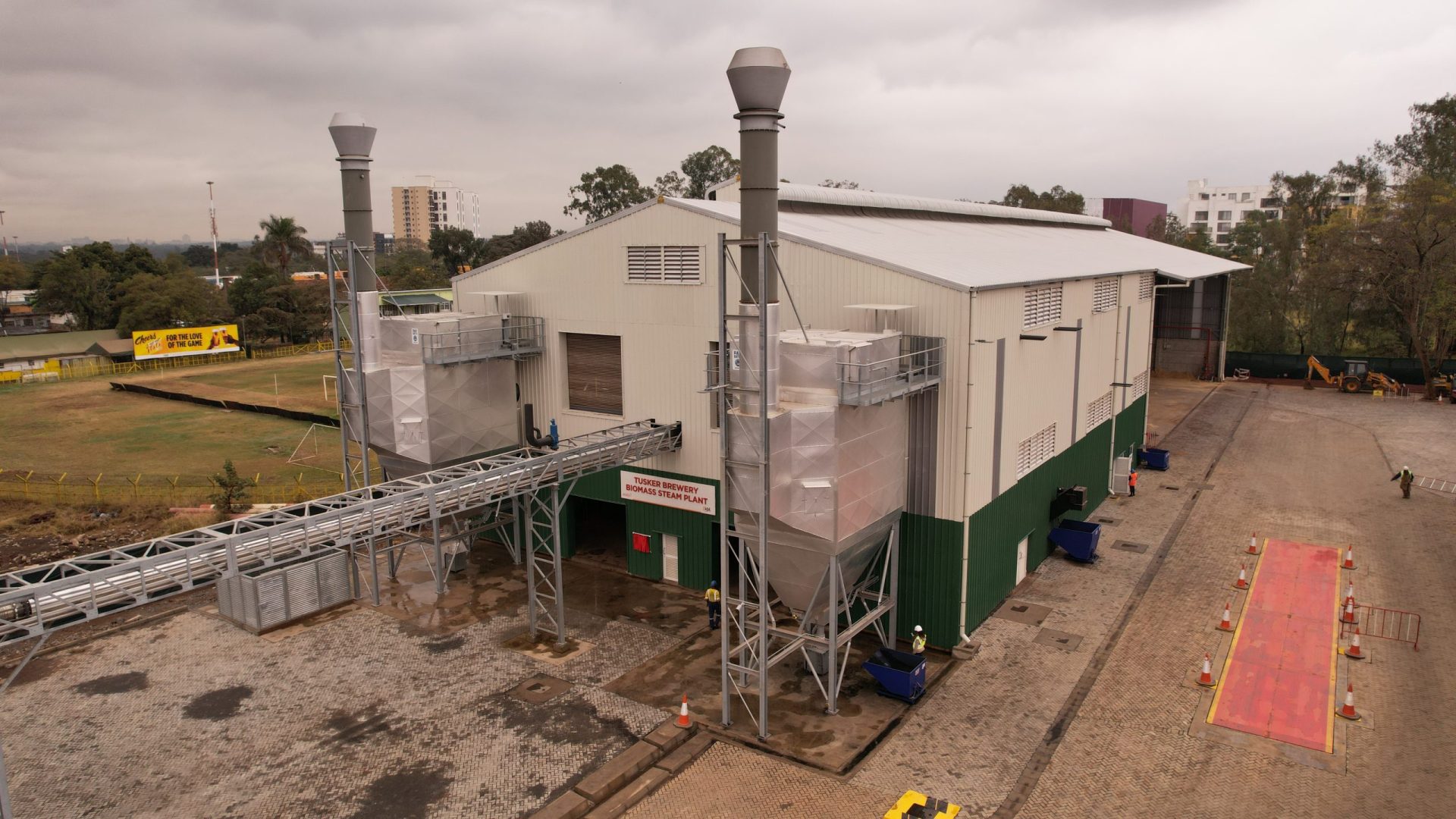The East African Breweries Limited (EABL) has invested in biomass boilers for energy production during the manufacturing process.
The investment in biomass boilers was announced two year ago, as part of the company’s environmental investment that would also deliver new solar energy and water recovery plant.
The biomass boilers work in such a way that instead of using gas or oil to produce the heat, they combust raw materials such as wood pellets, husks among other sustainable materials to produce heat.
The Diageo-owned EABL has invested £34.26 million (KShs5.057 billion) in biomass power to replace heavy oil fuel at its plants in Kenya and Uganda and are being powered by sustainable raw materials such as bamboo, macadamia husks, coffee husks, bagasse and rise husks. This is spread across Kisumu (3,500 ton/year) CO2 saving, Nairobi (25,000 ton/year) CO2 saving, and Kampala (11,000 ton/year) CO2 saving. This is expected to contribute a carbon saving of 48,000 MT/year once commissioned.
The biomass boilers work similar way to conventional boilers, combusting fuel to produce heat that is then used to heat water. They are bigger than the fossil fuel ones. This is because since they burn raw materials as opposed to gas, they tend to be large in order to hold the bigger volume of materials.
They work by burning biological matter and outputting the resulting heat for use in heating systems. Raw materials such as bamboo, macadamia husks, coffee husks, bagasse and rise husks are fed automatically or semi-automatically into a combustion chamber where they are ignited.
The hot gas and air produced by this process travel through a vent, and are then passed through a heat exchanger, which transfers the heat to the water used in the property’s central heating system. The excess heat is stored in a thermal tank.
In May, Diageo PLC Chief Executive Officer Ivan Menezes said addressing climate change was a priority for the company as they sought to substantially increase their share of renewable energy use in the global energy mix.
“Diageo has set ambitious environmental targets, aligning with the United Nations global SDGs, and efforts to deliver on these continue at pace. The biomass project in Kenya and Uganda is among the biggest investments in addressing climate change issues across sub-Saharan Africa countries. Using clean and affordable energy sources and offsetting our carbon footprint demonstrates the strength of our commitment in pioneering grain-to-glass sustainability, positively impacting the communities in which we live and work,” said Mr. Menezes.
As of May 2022, the project was approximately 92 percent complete and according to EABL Group CEO & MD Jane Karuku, they were expecting all sites to be operational by mid-July. “This investment continues our work to provide sustainable solutions for our local supply chains. It will create over 900 direct and indirect green jobs throughout the supply chain, particularly with local farmers who will be contracted to provide the raw materials,” said Ms. Karuku.
The EABL’s six biomass boilers are in Nairobi, Kisumu, and Kampala. In Nairobi, there are two boilers at Tusker plant with each boiler having a capacity of processing 18 tonnes of biofuel per hour. In Kisumu, there are also two boilers with each having a capacity of processing six tonnes of biofuel per hour, while in Kampala, there are two other boilers each with a capacity of processing eight tonnes of biofuel per hour.
Besides rolling out use of biomass boilers with locally renewable fuel, EABL is also implementing solar installations in all of its breweries with the capacity to meet a tenth of the company’s electricity needs.
The company says it will eventually work towards 100 percent renewable electricity by 2030 in all its plants. “Since the beginning of the implementation of the Diageo Society 2030: Spirit of Progress Sustainability Plan, we have focused on emissions that are produced within our own factories as well as those related to the energy we utilized in our facilities.”
The company aims to achieve net-zero carbon by 2030, since a significant amount of the firm’s emissions comes from its activities within its supply chain.

 Kenya Breweries Limited (KBL) biomass plant
Kenya Breweries Limited (KBL) biomass plant









